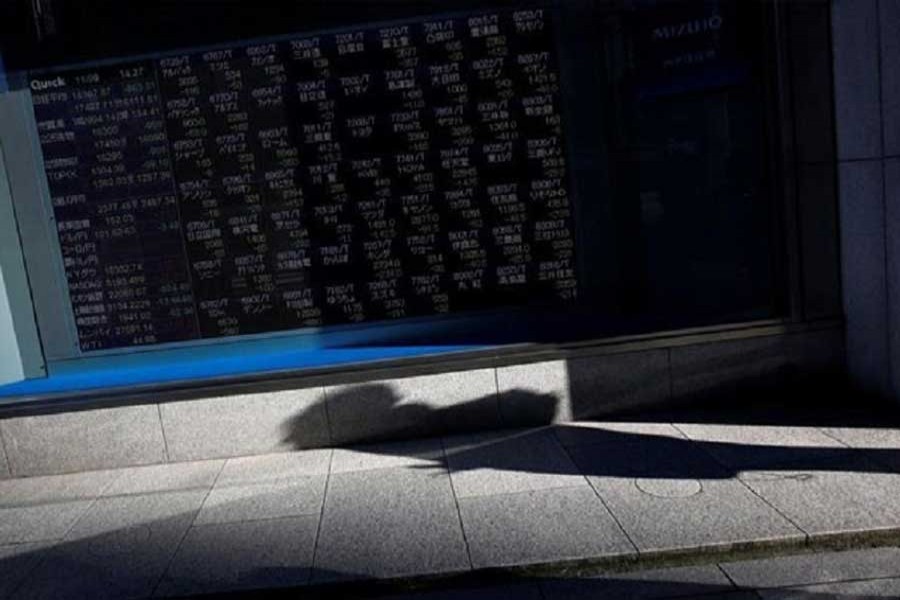Asia stocks pared early gains on Friday as caution crept in ahead of the US earnings season and as investors weighed the possible impact on global growth from a tariff spat between the United States and China.
Investors were also left digesting mixed data from China which showed March exports unexpectedly fell 2.7 per cent from a year earlier while imports grew more than forecast.
That left the country with a rare trade deficit of $4.98 billion for the month, the first since last February.
China is the world’s biggest net crude oil consumer and top buyer of copper, coal, iron ore and soy.
MSCI’s broadest index of Asia-Pacific shares outside Japan .MIAPJ0000PUS was up a slim 0.07 per cent, having risen as much as 0.5 per cent in morning trading.
It is still up about 2.0 per cent on the week.
Chinese shares took a small knock, with both the blue-chip CSI300 index .CSI300 and Shanghai's SSE Composite .SSEC off 0.4 per cent. Hong Kong's Hang Seng index .HSI eased 0.1 per cent while Japan's Nikkei .N225 gained 0.5 per cent.
Meanwhile, futures pointed to a weak start for US shares with E-Minis for S&P 500 ESc1 down 0.3 per cent.
The earnings season begins in earnest on Friday with reports from JPMorgan Chase & Co, Citigroup Inc and Wells Fargo & Co.
Analysts expect quarterly profit for S&P 500 companies to rise 18.4 per cent from a year ago, in what would be the biggest gain in seven years, according to Thomson Reuters.
“Our US equity strategists think that this earnings season should be a significant support for equities as companies deliver stronger than expected earnings growth and provide guidance on shareholder return from the tax windfall,” analysts at JPMorgan said in a note.
“Our Asia equity strategists agree.”
However, trade tensions dominated conversations with analysts at Citi noting prolonged uncertainty will likely hurt open Asian economies such as Taiwan, Singapore and South Korea.
In a change of tack, Trump on Thursday asked his trade advisers to look at re-joining the Trans Pacific Partnership, a multinational trade pact he withdrew the United States from early last year.
But he later tweeted that the United States would only join the TPP if the deal were substantially better than the one offered to former President Barack Obama.
“Markets have been pushed around by Trump,” said Hiroshi Watanabe, economist at Sony Financial Holdings.
“His modus operandi seems to do anything that seems to be good for his re-election. If protectionism doesn’t work, he may switch to international trade,” he added.
“Markets are still not yet convinced yet if the US is really re-joining the TPP. But if it does, it’s very positive for the global economy and stock markets will like it.”
In the currency market, the dollar was a shade firmer at 107.35 yen JPY=, edging near to a five-week high of 107.49 touched on April 5.
The yen is sought when investors turn risk averse because Japan’s hefty current surplus and massive offshore assets provide protection against the capital outflows deficit-running countries are vulnerable to.
The euro EUR= was flat at $1.2328, though on the week it has kept gains of 0.4 per cent.
Oil prices edged lower following suggestions from US President Donald Trump that a military strike on Syria may not be imminent. They are still set for their biggest weekly gains since last July.
Brent crude futures LCOc1 were off 20 cents at $71.82 a barrel, not far from Wednesday’s high of $73.09. US WTI crude futures CLc1 slipped 20 cents to $66.89.
Elsewhere, bitcoin BTC=BTSP fetched $7,968.5 after 14.2 per cent gains on Thursday, its biggest gain in four months.


